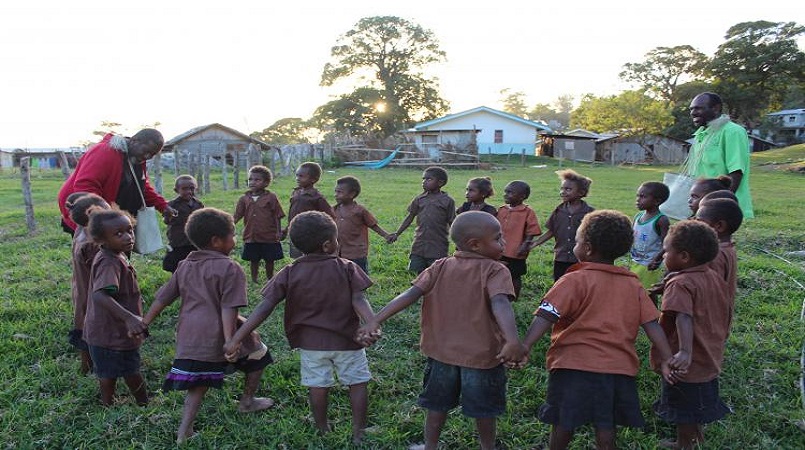
Usually the sea is very friendly and welcoming. But on this day, it was another story, with very large waves and strong winds.
On a boat that seemed to flow like a rollercoaster on the waves, Edgar Tarigarae embarked on a journey to some of the most remote communities in Penama Province to share the importance of family support for successful early childhood care and education (ECCE).
“Usually we are greeted by good weather when we reach out to communities, but on this day, the weather was so rough,” says Edgar, the Penama Provincial Preschool Coordinator at the Ministry of Education and Training (MOET) in Vanuatu. “But it was my passion for working with children and improving early childhood learning that kept me going on a positive mindset.”
Penama Province is one of the six provinces of Vanuatu, located in the northeast of the Pacific island country and made up of three islands – Pentecost, Ambae and Maewo – with over 400 communities, mostly remote.
“As soon as you enter the communities, you will see lots of smiling faces from the locals. There are good roads available but many hills to climb on Pentecost Island. It is in this province that one would see more than a thousand children enrolled in early childhood education.”
However, even with a high number of children enrolled in ECCE centres, there was limited learning support at home, which is crucial in improving children’s development.
UNICEF partnered with MOET for a community-to-community teacher-parent training on ECCE called Parent Support Programme (PSP), funded by Dubai Cares. The programme focused on engaging families to build a solid relationship between homes and schools, with the pilot rolled out in Penama Province in 2018/2019.
More than 180 teachers and approximately 3,000 parents and caregivers were trained on how they can assist their children in different ways of learning.
Edgar, who was one of the trainers, highlighted the previous lack of support from parents and caregivers for children in learning. “I would enter classrooms and look at the children whose parents were not able to support learning at home. The children felt really down and were not happy,” says Edgar. “I could see from the faces of the children that they were sad and not able to keep up in class. Sometimes they would even go to other families to ask for help to learn.”
Edgar used a facilitator’s manual for the trainings that was developed with support from UNICEF. This manual looked at topics including healthy brain development, proper handwashing, positive discipline, and supporting children with disability and safety at home, among others.
After these trainings, Edgar noticed parents and caregivers were more focused and were increasingly using a hands-on approach to their child’s learning. They now had the knowledge on how they could play a vital role in ECCE.
“There was a lot of good feedback from parents, with a 70 per cent improvement of parents and caregiver involvement in learning at schools after these trainings. Not only mothers, but even the fathers were involved. It seemed like parents started changing their behaviour and mindset from believing that only teachers play a role in their child’s learning to a more participatory approach.”
Edgar noticed that parents and caregivers now understood the importance of telling stories and interacting with children through play. Children are also eating healthier, reducing the incidence of illness.
For Edgar, this was an incredible experience as he built on his passion for strengthening education. Now, he is actually looking forward to ‘making waves’ as the PSP rolls out to other provinces.
Photo supplied UNICEF Pacific Caption: Edgar Tarigarae (far left in red) plays and engages with children during the Parent Support Programme.
